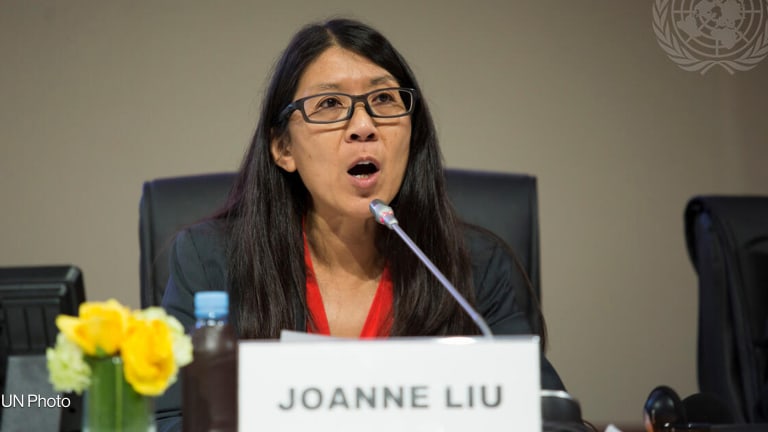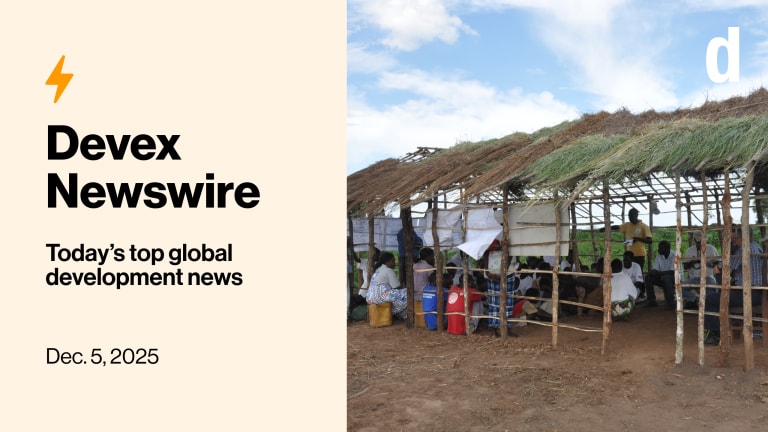
CANBERRA — The response to an epidemic starts within the community, according to Dr. Joanne Liu, international president of Médecins Sans Frontières. But with the current Ebola outbreak facing the Democratic Republic of the Congo, Liu told Devex communities have been left behind, creating a failure in the response.
“The community is confused,” she said. “They said we come, drive too fast on the streets and get out in spaceman suits. Then we take their loved ones that they may never see again. They don’t understand what is going on.”
“Humanitarian aid will be tolerated only when it serves a political agenda of nations — otherwise it will be under attack.”
— Dr. Joanne Liu, international president, MSFIt is made worse, Liu said, after decades of DRC being ignored by the world, while malaria and pneumonia still regularly claim lives.
“And after that Ebola comes — it is an additional issue among many others. But this makes it very difficult for the community to understand why — after facing many adversities over decades — all of a sudden, the world is coming to them wanting to contain Ebola.”
A keynote speaker at the World Association for Disaster and Emergency Medicine’s Congress on Disaster and Emergency Medicine held in Brisbane, Australia, from May 7-10, Liu cited the Ebola crisis in discussing the future of emergency response. The growing security mindset in responding to humanitarian crises, she said, risked distorting the response and management and creating greater division with communities in need of support.
Fighting the security mindset
“We are in a situation that nations only respond and mobilize when they feel their nation is at stake,” Liu said, sharing her thoughts on risks to humanitarian responses she fears are growing.
“This is what we saw in 2014 and 2015 with the Ebola outbreak in West Africa. Only when people started returning to their home countries in the United States or Europe sick were they paying attention — Ebola was knocking at their door.”
More on Ebola:
► WHO not equipped for conflict response, says former Ebola czar
► In Ebola-hit DRC, wins and challenges of community engagement
The security mindset, she said, is now prominent in the decision to responding to crises. Aside from Ebola, Liu said that this is also seen in the response to the needs of migrants and refugees with many nations only seeing this as a “crisis” when refugees appear at their borders — despite it being a crisis long before that point.
“With a security mindset, people will always respond late,” Liu said. “Instead of responding in a timely fashion, they will wait instead until they feel threatened.”
And it also impacts government perceptions of humanitarian aid and its providers.
“Somehow humanitarian aid will be tolerated only when it serves a political agenda of nations — otherwise it will be under attack.”
Preparing for the future
The theme of the WADEM congress was the future of emergency medicine — and Liu explained to Devex that this security mindset is one of the biggest challenges MSF will be facing that can impact its ability to respond to humanitarian crises and access those in need of assistance.
Along with responding to hotspot emergencies including Ebola, refugees and migrants will continue to be a focus in shifting governments worldwide away from a security mindset.
“This will remain a challenge for us because it is affecting everywhere,” Liu said. “We have hardening discourse on refugees and migrants and what we have been facing over the past few years is the criminalizing of migrants and refugees as well as people who are giving aid to those who are fleeing.
“This happened to us in Gibraltar last year when our boat was stripped of its flag. This happened twice in a row and we had to stop our search and rescue in the Mediterranean Sea.”
MSF is also faced with greater difficulty in accessing populations because of security concerns. Syria, Yemen, and West Africa are among these regional challenges.
“People don’t have access to medicine — we have been very outspoken on this,” Liu said.
And it is starting to gear up on climate change — particularly in the Pacific knowing that this, too, is an area many governments will not prepare for until it is officially declared a crisis.
“In addressing the security mindset, it’s important that we do understand that people have fear but we shouldn’t be driven by it — fear is a good servant but a bad master, and we need to resist it,” Liu said. “If we don’t do that, we will always be late.”








